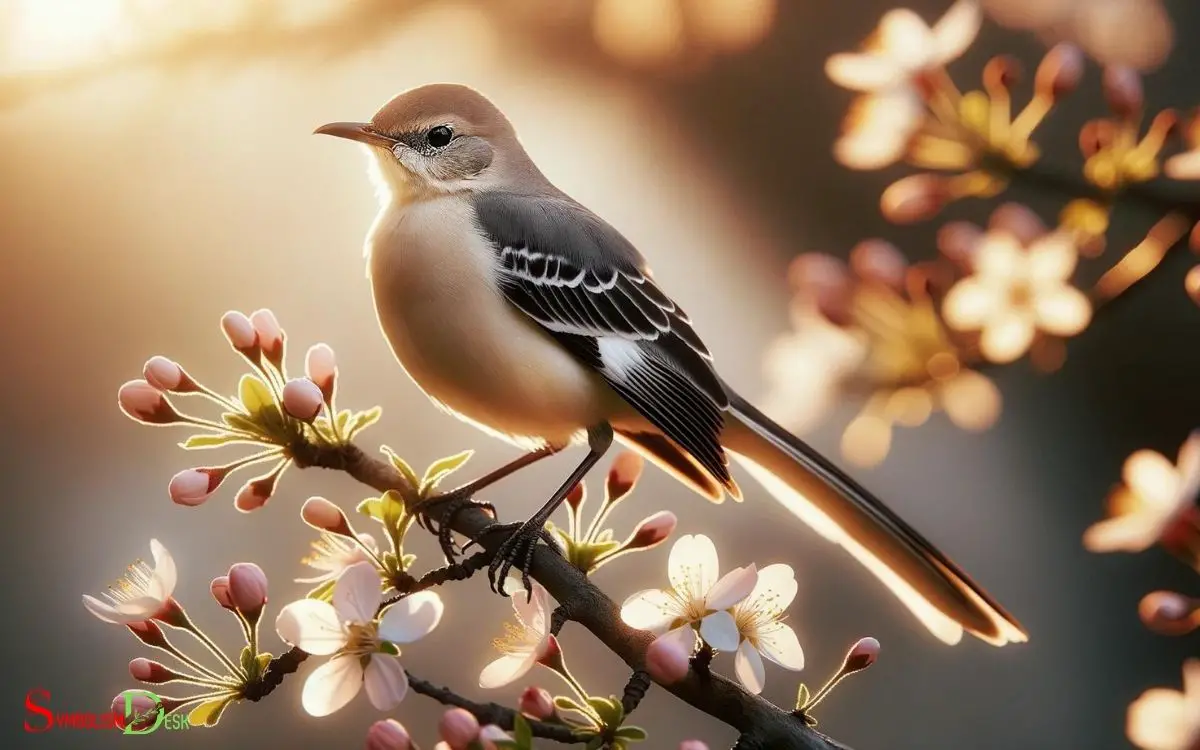What Is the Symbolic Meaning of the Mockingbird? Purity!
The mockingbird symbolizes innocence, purity, and harmlessness, often used to convey the wrongness of injuring or oppressing those who do not harm others.
The symbolic meaning of the mockingbird is multi-layered, with its most prominent interpretation being a representation of innocence and the idea that it is sinful to harm something that means no harm.
This symbolism is famously highlighted in Harper Lee’s novel, ‘To Kill a Mockingbird,’ where the bird represents the idea of innocence that should not be corrupted or destroyed.
Here’s a brief breakdown of the mockingbird’s symbolic meanings:
- Innocence: Just as mockingbirds simply sing and bring beauty without doing any harm, they are often used to symbolize the purity and innocence of a character or situation.
- Harmlessness: The bird’s lack of malice towards others makes it a symbol of peacefulness and the idea that it is unjust to hurt those who are harmless.
- Freedom: With its ability to fly and sing freely, the mockingbird can also represent freedom of expression and thought.
Embodying purity and peacefulness, the mockingbird’s symbolism serves as a moral compass in literature and cultural narratives. The mockingbird’s significance as a symbol of innocence and harmony is often used to guide characters through difficult moral decisions in stories and to teach important life lessons. In cultural narratives, the gentle nature of the mockingbird is celebrated and revered for its ability to bring tranquility and clarity to challenging situations. In a similar vein, individuals may find themselves drawn to discover white butterfly symbolic meaning, seeking out the deeper significance behind the delicate and ethereal creature. Like the mockingbird, the white butterfly also represents purity and transformation, serving as a guide for those in search of spiritual enlightenment and personal growth.

Key Takeaway
Historical Significance of the Mockingbird
The historical significance of the mockingbird dates back to the early colonial period in America. European settlers were enchanted by the bird’s ability to mimic the calls of other species and its resilience in thriving across different landscapes.
Mockingbirds became a symbol of adaptability and resilience, qualities highly esteemed by the early American society.
Their beautiful songs also captured the imagination of poets and writers, featuring prominently in literature and folklore. This historical reverence for the mockingbird laid the foundation for its enduring significance in American culture and beyond.
This historical backdrop sets the stage for exploring the diverse symbolism of the mockingbird in different cultures.
Mockingbird Symbolism in Different Cultures
Revered for its adaptability and resilience, the mockingbird holds diverse symbolic meanings in different cultures, reflecting its enduring significance across various societies.
In Native American culture, the mockingbird symbolizes courage, positivity, and protection, embodying the spirit of fearlessness and hope.
In Chinese folklore, the mockingbird represents happiness, good fortune, and friendship, bringing joy and luck to those who encounter its song.
In Caribbean traditions, the mockingbird is seen as a symbol of healing, renewal, and harmony, believed to bring peace and restoration to both the body and the soul.
Across the globe, the mockingbird’s symbolism resonates deeply with the values and beliefs of different cultures, illustrating its universal appeal and timeless relevance.
Mockingbird as a Representation of Innocence
Across cultures, a mockingbird is often seen as a representation of innocence, embodying a purity and gentleness that transcends language and tradition. In literature and folklore, the mockingbird symbolizes innocence due to its song-like calls and harmless nature.
This symbolism can be seen in Harper Lee’s novel “To Kill a Mockingbird,” where the innocent characters, such as Tom Robinson and Boo Radley, are metaphorically portrayed as mockingbirds.
The table below further illustrates how the mockingbird is perceived as a representation of innocence in different cultures:
| Culture | Mockingbird Symbolism |
|---|---|
| American | Symbol of purity and innocence, often associated with childhood |
| Chinese | Represents good fortune, happiness, and a carefree nature |
| Native American | Viewed as a positive omen, signifying peace and tranquility |
The consistent portrayal of the mockingbird as a symbol of innocence across various cultures highlights its universal significance in representing purity and kindness.
Mockingbird’s Role in Literature and Folklore
Symbolizing innocence in literature and folklore, the mockingbird’s role is deeply entrenched in its portrayal as a gentle and pure creature. In various literary works and folklore, the mockingbird serves as a powerful symbol, evoking emotions such as empathy, protection, and resilience.
Readers often feel a sense of empathy towards the mockingbird, as it’s frequently depicted as a defenseless and kind-hearted creature, making it easy for them to connect with the bird on an emotional level.
The mockingbird’s role as a symbol of protection resonates with audiences, as it represents the need to safeguard the vulnerable and the innocent in society.
Through its symbolic representation in literature and folklore, the mockingbird embodies the concept of resilience, inspiring individuals to persevere in the face of adversity.
This portrayal in literature and folklore enriches the understanding of the mockingbird’s symbolic significance.
Mockingbird as a Symbol of Resilience and Adaptability
The mockingbird’s symbolic representation in literature and folklore is deeply rooted in its portrayal as a defender of innocence and a survivor of hardship.
Mockingbirds are renowned for their ability to thrive in diverse environments and to mimic the sounds of other birds, showcasing their remarkable adaptability.
Their resilience is evident in their ability to sing even in challenging urban settings and their capacity to endure harsh conditions.
In literature, the mockingbird often symbolizes the tenacity to overcome adversity and the strength to persevere despite obstacles.
This symbolism has resonated with audiences seeking to understand the value of resilience and adaptability in the face of adversity. The mockingbird has become a powerful emblem of hope and endurance in the human experience.
Mockingbird’s Connection to Freedom and Individuality
The mockingbird symbolizes freedom and individuality as it signifies the ability to express oneself and soar without constraints. This bird’s connection to freedom and individuality evokes a sense of inspiration and empowerment in those who admire its symbolism.
- Unbridled Expression: The mockingbird’s melodious songs reflect the freedom of expression, inspiring individuals to express themselves authentically and without reservation.
- Fearless Independence: The mockingbird’s fearless defense of its territory represents the courage to assert one’s individuality and stand up for personal beliefs and values.
- Boundless Creativity: The mockingbird’s diverse repertoire of songs showcases its creativity, encouraging others to embrace their unique talents and creativity without limitations.
The mockingbird’s association with freedom and individuality serves as a powerful reminder to embrace these qualities in our own lives.
Are Mockingbirds and Hummingbirds Both Symbolic of Positive Traits?
Both mockingbirds and hummingbirds hold a significant place in various cultures due to their symbolic meaning of hummingbird. Mockingbirds symbolize innocence and purity, while hummingbirds represent joy and playfulness. Both birds are seen as positive symbols in different contexts, and their presence is often considered auspicious.
Contemporary Interpretations of the Mockingbird Symbol
Contemporary interpretations of mockingbird symbolism have evolved to reflect its relevance in modern society. The mockingbird is now seen as a symbol of empathy and the need to protect the vulnerable.
In today’s context, the mockingbird represents the call for kindness and compassion towards those who are marginalized or oppressed. It serves as a reminder to stand up against injustice and to use one’s voice to defend those who can’t defend themselves.
The mockingbird’s significance has expanded to encompass the idea of being an ally and using privilege to support others. Its symbolism is often associated with social movements advocating for equality and justice.
In contemporary perspectives, the mockingbird continues to inspire individuals to promote understanding and to uphold the values of empathy and solidarity.
Conclusion
The mockingbird’s symbolic meaning is deeply rooted in history, culture, and literature.
Despite its association with innocence, resilience, and freedom, the irony lies in the fact that this beloved symbol is often under threat from human actions.
As we continue to appreciate the mockingbird’s significance, let’s also strive to protect and preserve these gentle creatures, ensuring that their symbolic meaning remains a source of inspiration for generations to come.






